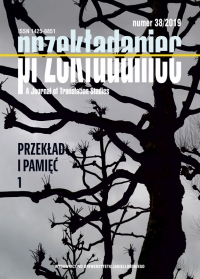Językowa tożsamość świadka. Analiza mowy mieszkańców chełmna nad nerem w scenie przed kościołem
Bystanders Speaking. The Language Identity of the People of Chełmno in Claude Lanzmann’s Shoah
Author(s): Joanna Sobesto, Magda HeydelSubject(s): History of the Holocaust, Film / Cinema / Cinematography, Translation Studies, Identity of Collectives
Published by: Wydawnictwo Uniwersytetu Jagiellońskiego
Keywords: Lanzmann; Shoah; Chełmno on Ner; Holocaust; bystanders; translation;
Summary/Abstract: The main problem discussed in the paper is the authenticity of speech of the inhabitants of Chełmno in the sequence filmed outside the parish church in Claude Lanzmann’s Shoah. The authors analyze a number of characteristic features of the bystanders’ language vis a vis the French translation provided on-stage by the interpreter Barbara Janicka, and the English subtitles. It is argued that the language of the bystanders carries important information on the speakers’ individual and collective identity, and gives clues on the construction of memory, not just on the level of meanings, but also in its materiality. The analysis focuses on four planes which were identified as important for the construction of the implicit messages: semantic ambiguity of the utterances; narrative techniques used by the speakers; verb forms, especially the impersonal use of verbs; and syntax. The specific linguistic traits of the language used testify to the fact that the speakers lack adequate tools to verbalize their traumatic memories and to reflect on the reality that they were part of. The analysis of the linguistic landscape of the scene also leads to conclusions about the instrumentalization of speakers on the part of the film director. The French and English translation in and of the sequence – a summary rather than a rendition – clearly, albeit perhaps not intentionally, contributes to this effect. Through linguistic analysis and wide contextual interpretation, unpacking the way the bystanders speak, creates a new, hitherto unacknowledged, source of knowledge on witnessing and trauma.
Journal: Przekładaniec.
- Issue Year: 2019
- Issue No: 38
- Page Range: 53-74
- Page Count: 22
- Language: Polish

